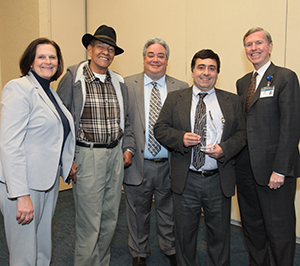Holy Cross Hospital Cancer Institute Celebrates 10 Years of Lung Screening Program, Expands Lung Services
March 13, 2015Tags: 2015
|
It's been more than a decade since the first patient was screened through the International Early Lung Cancer Action Program (I-ELCAP) at Holy Cross Hospital, which began in 2004. Since then, thanks to support from the John and Amy Mewhiney Cancer Foundation, more than 1,500 individuals have received free screenings, and Holy Cross Hospital is the only member hospital in the Washington, D.C., metropolitan area to participate in this clinical trial.
I-ELCAP is the largest, long-term study to determine the usefulness of annual screening using low-dose spiral CT (computed tomography) to detect lung cancer in smokers and ex-smokers. As the leading cause of cancer death in the United States, only 15 percent of patients with lung cancer survive five years after diagnosis, as half of cases present with advanced-stage disease. Early detection through screening programs such as I-ELCAP offers hope for reduced mortality.
Just ask Dario Manzueta, a Holy Cross Hospital I-ELCAP enrollee who was diagnosed with stage IIB lung cancer in 2012, after receiving a low-dose CT scan. A long-time smoker who was referred to I-ELCAP through his primary care physician, Mr. Manzueta had surgery—a right upper lung lobectomy—performed by Holy Cross Hospital thoracic surgeon Dr. Bryan Steinberg, before undergoing four rounds of chemotherapy to treat his cancer. Today, Mr. Manzueta comes in for regular follow-up appointments and is feeling well, excited about the recent renovation of his home.
"The best hope for curing lung cancer is finding it as early as possible," says Dr. Steinberg. "Holy Cross Hospital's involvement and investment in this important research study has highlighted just how meaningful early screening is to saving lives."
Thanks in part to I-ELCAP research data, the Centers for Medicare and Medicaid Services announced in November that Medicare plans to cover low-dose CT lung cancer screening for patients who qualify. Progress in screening for early-stage lung cancer is only one piece of the puzzle.
Holy Cross Hospital is also expanding its care for patients who have a suspicious spot, or nodule, on their lung that may be cancer. Last year, the Cancer Institute started offering Electromagnetic Navigational Bronchoscopy (ENB), an advanced, minimally invasive procedure that allows physicians to locate hard-to-reach lesions for biopsy and possible treatment. Using GPS-like technology to navigate through a patient's natural lung airway, ENB allows physicians to diagnose lung cancer at earlier, more curable stages.
"For people diagnosed with lung cancer today, there is significantly more hope for survival than 10 or even just five years ago because the available technology and expertise is growing rapidly," says Cheryl Aylesworth, MD, medical oncologist and I-ELCAP principal investigator, Holy Cross Hospital. "Our comprehensive team and approach addresses prevention, screening, diagnosis, treatment and survivorship, to offer the best care possible for people at risk or who are living with lung cancer."
For more information about I-ELCAP, ENB or Holy Cross Hospital's lung cancer services, click here.

